新编英语教程5课文翻译(unit1~15)
新编英语教程5课文翻译(unit1-15)

新编英语教程5课文翻译(unit1-15) Unit 1 恰到好处你见过一个笨手笨脚的男人往箱子上钉钉子吗?只见他左敲敲,右敲敲,说不准还会将整个钉子锤翻,结果敲来敲去到头来只敲进了半截。
而娴熟的木匠就不这么干。
他每敲一下都会坚实巧妙地正对着钉头落下去,一钉到底。
语言也是如此。
一位优秀的艺术家谴词造句上力求准确而有力地表达自己的观点。
差不多的词,不准确的短语,摸棱两可的表达,含糊不清的修饰,都无法使一位追求纯真英语的作家满意。
他会一直思考,直至找到那个能准确表达他的意思的词。
The French have an apt(贴切的) phrase for this. They speak of “le mot juste,”法国人有一个很贴切的短语来表达这样一个意思,即“le mot juste”, 恰到好处的词。
有很多关于精益求精的作家的名人轶事,比如福楼拜常花几天的时间力求使一两个句子在表达上准确无误。
在浩瀚的词海中,词与词之间有着微妙的区别,要找到能恰如其分表达我们意思的词绝非易事。
这不仅仅是扎实的语言功底和相当大的词汇量的问题,还需要人们绞尽脑汁,要观察敏锐。
选词是认识过程的一个步骤,也是详细描述我们的思想感情并表达出来使自己以及听众和读者深刻理解的一个环节。
有人说:“在我思想未成文之前,我怎么知道自己的想法?”这听起来似乎很离谱,但它确实很有道理。
It is hard work choosing the right words, but we shall be rewarded by thesatisfaction that finding them brings. The e某act use of language gives us mastery(掌握) over the material we aredealing with. Perhaps you have been asked “What sort of a manis so-and-so(等)?” You begin: “Oh, I think he’s quite anice chap (家伙)but he’s rather…” and then you hesitate trying to find a word or phrase to e某press what it is abouthim that you do n’t like, that constitutes(构成) hislimitation. When you find the right phrase you feel that your conception of the man is clearer and sharper.寻找恰如其分的词的确是件不容易的事。
高级英语 新编英语教程5 课文+翻译 unit9
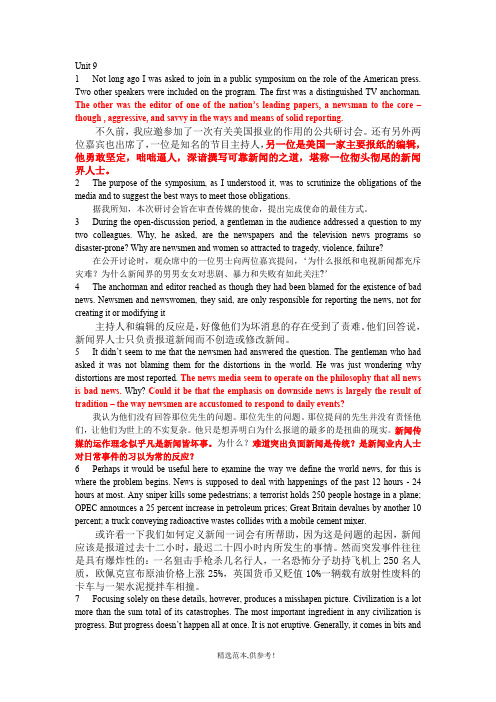
Unit 91 Not long ago I was asked to join in a public symposium on the role of the American press. Two other speakers were included on the program. The first was a distinguished TV anchorman. The other was the editor of one of the nation’s leading papers, a newsman to the core –though , aggressive, and savvy in the ways and means of solid reporting.不久前,我应邀参加了一次有关美国报业的作用的公共研讨会。
还有另外两位嘉宾也出席了,一位是知名的节目主持人,另一位是美国一家主要报纸的编辑,他勇敢坚定,咄咄逼人,深谙撰写可靠新闻的之道,堪称一位彻头彻尾的新闻界人士。
2 The purpose of the symposium, as I understood it, was to scrutinize the obligations of the media and to suggest the best ways to meet those obligations.据我所知,本次研讨会旨在审查传媒的使命,提出完成使命的最佳方式。
3 During the open-discussion period, a gentleman in the audience addressed a question to my two colleagues. Why, he asked, are the newspapers and the television news programs so disaster-prone? Why are newsmen and women so attracted to tragedy, violence, failure?在公开讨论时,观众席中的一位男士向两位嘉宾提问,‘为什么报纸和电视新闻都充斥灾难?为什么新闻界的男男女女对悲剧、暴力和失败有如此关注?’4 The anchorman and editor reached as though they had been blamed for the existence of bad news. Newsmen and newswomen, they said, are only responsible for reporting the news, not for creating it or modifying it主持人和编辑的反应是,好像他们为坏消息的存在受到了责难。
高级英语 新编英语教程5 课文+翻译 unit5
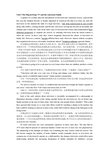
Unit 5 The Plug-in Drug: TV and the American FamilyA quarter of a century after the introduction of television into American society, a period that has seen the medium become so deeply ingrained in American life that in at least one state the television set has attained the rank of a legal necessity, 1safe from repossession in case of debt along with clothes, cooking utensils, and the like, television viewing has become an inevitable and ordinary part of daily life. Only in the early years of television did writers and commentators2have sufficient perspective to separate the activity of watching television from the actual content it offers the viewer. In those early days writers frequently discussed the effects of television on family life. However a curious 3myopia afflicted those early observers: almost without exception they regarded television as a favorable, beneficial, indeed, 4wondrous influence upon the family.在电视机这项发明进入美国人生活的25后,他已经在美国人的生活中根深蒂固,甚至美国至少有一个州的法律规定电视机是生活的必须品,而且如果负债,它可以和衣物,厨具一样免于作为财产抵押,而且看电视也成为人们生活中非常普遍甚至是不可避免的活动。
全新版大学英语综合教程5 unit1 课后答案

1.(1) allot
(2) go through fire and water
(3) reside
(4) sobbed
(5) made no mention of
(6) sacrifice
(7) came upon
(8) rhythm
2. She had thought that books were natural wonders, coming up of themselves like grass. So it was "startling and disappointing" for her to find out that story books had been, contrary to her expectations, written by people.
(8) Answer: an old Ford
P24 cloze
(1) Answer: go through fire and water
(2) Answer: salary
(3) Answer: give
(4) Answer: no peace
(5) Answer: sink into
(7) inward
5. (1) Answer: have come upon / across
(2) Answer: had come out
(3) Answer: come on / up
(4) Answer: came across
(5) Answer: comes down to
7. The book was completely worn out - it was lacking its front cover, the back held on by strips of pasted paper, and the pages stained; its illustrations had come unattached. Welty's father had lost his mother when he was seven, and this book was the only book he as a little boy had had of his own. Although he had never made any mention to his own children of the book, he had brought it along with him from Ohio to their house and shelved it in their bookcase.
Unit 1 Love of reading全新版大学英语综合教程五课文翻译
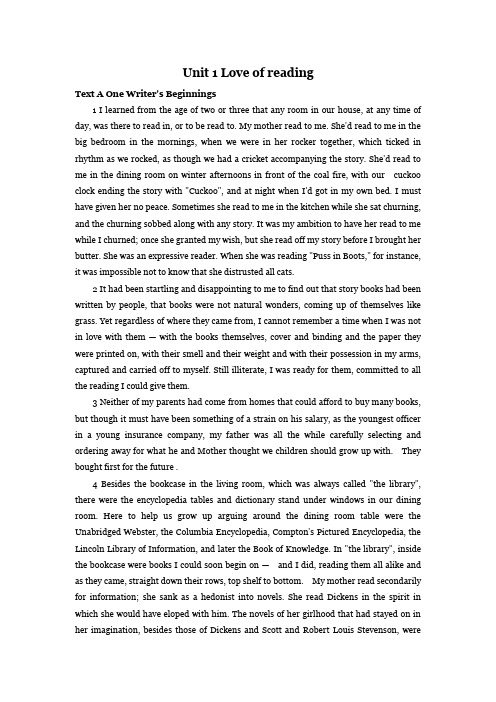
Unit 1 Love of readingText A One Writer's Beginnings1 I learned from the age of two or three that any room in our house, at any time of day, was there to read in, or to be read to. My mother read to me. She'd read to me in the big bedroom in the mornings, when we were in her rocker together, which ticked in rhythm as we rocked, as though we had a cricket accompanying the story. She'd read to me in the dining room on winter afternoons in front of the coal fire, with our cuckoo clock ending the story with "Cuckoo", and at night when I'd got in my own bed. I must have given her no peace. Sometimes she read to me in the kitchen while she sat churning, and the churning sobbed along with any story. It was my ambition to have her read to me while I churned; once she granted my wish, but she read off my story before I brought her butter. She was an expressive reader. When she was reading "Puss in Boots," for instance, it was impossible not to know that she distrusted all cats.2 It had been startling and disappointing to me to find out that story books had been written by people, that books were not natural wonders, coming up of themselves like grass. Yet regardless of where they came from, I cannot remember a time when I was not in love with them —with the books themselves, cover and binding and the paper they were printed on, with their smell and their weight and with their possession in my arms, captured and carried off to myself. Still illiterate, I was ready for them, committed to all the reading I could give them.3 Neither of my parents had come from homes that could afford to buy many books, but though it must have been something of a strain on his salary, as the youngest officer in a young insurance company, my father was all the while carefully selecting and ordering away for what he and Mother thought we children should grow up with. They bought first for the future .4 Besides the bookcase in the living room, which was always called "the library", there were the encyclopedia tables and dictionary stand under windows in our dining room. Here to help us grow up arguing around the dining room table were the Unabridged Webster, the Columbia Encyclopedia, Compton's Pictured Encyclopedia, the Lincoln Library of Information, and later the Book of Knowledge. In "the library", inside the bookcase were books I could soon begin on —and I did, reading them all alike and as they came, straight down their rows, top shelf to bottom. My mother read secondarily for information; she sank as a hedonist into novels. She read Dickens in the spirit in which she would have eloped with him. The novels of her girlhood that had stayed on in her imagination, besides those of Dickens and Scott and Robert Louis Stevenson, wereJane Eyre, Trilby, The Woman in White, Green Mansions, King Solomon's Mines.5 To both my parents I owe my early acquaintance with a beloved Mark Twain. There was a full set of Mark Twain and a short set of Ring Lardner in our bookcase, and those were the volumes that in time united us all, parents and children.6 Reading everything that stood before me was how I came upon a worn old book that had belonged to my father as a child. It was called Sanford and Merton. Is there anyone left who recognizes it, I wonder? It is the famous moral tale written by Thomas Day in the 1780s, but of him no mention is made on the title page of this book; here it is Sanford and Merton in Words of One Syllable by Mary Godolphin. Here are the rich boy and the poor boy and Mr. Barlow, their teacher and interlocutor, in long discourses alternating with dramatic scenes —anger and rescue allotted to the rich and the poor respectively. It ends with not one but two morals, both engraved on rings: "Do what you ought, come what may," and "If we would be great, we must first learn to be good."7 This book was lacking its front cover, the back held on by strips of pasted paper, now turned golden, in several layers, and the pages stained, flecked, and tattered around the edges; its garish illustrations had come unattached but were preserved, laid in. I had the feeling even in my heedless childhood that this was the only book my father as a little boy had had of his own. He had held onto it, and might have gone to sleep on its coverless face: he had lost his mother when he was seven. My father had never made any mention to his own children of the book, but he had brought it along with him from Ohio to our house and shelved it in our bookcase.8 My mother had brought from West Virginia that set of Dickens: those books looked sad, too — they had been through fire and water before I was born, she told me, and there they were, lined up — as I later realized, waiting for me.9 I was presented, from as early as I can remember, with books of my own, which appeared on my birthday and Christmas morning. Indeed, my parents could not give me books enough. They must have sacrificed to give me on my sixth or seventh birthday — it was after I became a reader for myself-the ten-volume set of Our Wonder World. These were beautifully made, heavy books I would lie down with on the floor in front of the dining room hearth, and more often than the rest volume 5, Every Child's Story Book, was under my eyes. There were the fairy tales —Grimm, Andersen, the English, the French, "Ali Baba and the Forty Thieves"; and there was Aesop and Reynard the Fox; there were the myths and legends, Robin Hood, King Arthur, and St. George and the Dragon, even the history of Joan of Arc; a whack of Pilgrim's Progress and a long piece of Gulliver. They all carried their classic illustrations. I located myself in these pages andcould go straight to the stories and pictures I loved; very often "The Yellow Dwarf" was first choice, with Walter Crane's Yellow Dwarf in full color making his terrifying appearance flanked by turkeys. Now that volume is as worn and backless and hanging apart as my father's poor Sanford and Merton. One measure of my love for Our Wonder World was that for a long time I wondered if I would go through fire and water for it as my mother had done for Charles Dickens; and the only comfort was to think I could ask my mother to do it for me.10 I believe I'm the only child I know of who grew up with this treasure in the house.I used to ask others, "Did you have Our Wonder World?" I'd have to tell them The Book of Knowledge could not hold a candle to it.11 I live in gratitude to my parents for initiating me —as early as I begged for it, without keeping me waiting — into knowledge of the word, into reading and spelling, by way of the alphabet. They taught it to me at home in time for me to begin to read before starting to school.12 Ever since I was first read to, then started reading to myself, there has never beena line read that I didn't hear. As my eyes followed the sentence, a voice was saying it silently to me. It isn't my mother's voice, or the voice of any person I can identify, certainly not my own. It is human, but inward, and it is inwardly that I listen to it. It is to me the voice of the story or the poem itself. The cadence, whatever it is that asks you to believe, the feeling that resides in the printed word, reaches me through the reader-voice: I have supposed, but never found out, that this is the case with all readers — to read as listeners — and with all writers, to write as listeners. It may be part of the desire to write. The sound of what falls on the page begins the process of testing it for truth , for me. Whether I am right to trust so far I don't know. By now I don't know whether I could do either one, reading or writing, without the other.13 My own words, when I am at work on a story, I hear too as they go, in the same voice that I hear when I read in books. When I write and the sound of it comes back to my ears, then I act to make my changes. I have always trusted this voice.作家起步时我从两三岁起就知道,家中随便在哪个房间里,白天无论在什么时间,都可以念书或听人念书。
李观仪《新编英语教程(5)》(第3版)学习指南【词汇短语+课文精解+全文翻译+练习答案】

李观仪《新编英语教程(5)》(第3版)学习指南【词汇短语+课文精解+全文翻译+练习答案】目录Unit 1 一、词汇短语 二、参考译文 三、课文注释 四、练习答案Unit 2 一、词汇短语 二、参考译文 三、课文注释 四、练习答案Unit 3 一、词汇短语 二、参考译文 三、课文注释 四、练习答案Unit 4 一、词汇短语 二、参考译文 三、课文注释 四、练习答案Unit 5 一、词汇短语 二、参考译文 三、课文注释 四、练习答案Unit 6 一、词汇短语 二、参考译文 三、课文注释 四、练习答案Unit 7 一、词汇短语 二、参考译文 三、课文注释 四、练习答案Unit 8 一、词汇短语 二、参考译文 三、课文注释 四、练习答案Unit 9 一、词汇短语 二、参考译文 三、课文注释 四、练习答案Unit 10 一、词汇短语 二、参考译文 三、课文注释 四、练习答案Unit 11 一、词汇短语 二、参考译文 三、课文注释 四、练习答案Unit 12 一、词汇短语 二、参考译文 三、课文注释 四、练习答案弘博学习网————各类考试资料全收录内容简介《新编英语教程(第3版)学习指南》按照原教材的课次进行编写,每单元涉及单元语法、词汇短语、参考译文、课文精解以及练习答案等内容,旨在帮助学生更好、更高效地学习和掌握教材中的重点及难点知识,具有很强的针对性和实用性。
在编写过程中,该书力求突出重点,答疑难点,语言言简意赅,讲解深入浅出,希望它能得到广大英语专业学生和英语自学者的喜爱和认可。
弘博学习网————各类考试资料全收录Unit 1一、词汇短语Text I1clumsy [5klQmzi] adj. moving or doing things in a very awkward way 笨拙的,拙劣的:I spilt your coffee. Sorry—that was clumsy of me.我把你的咖啡弄洒了。
(完整版)新编英语教程5练习册答案(1-5单元)

ParaphraseUnit1.1 A writer who pay great attention to expressing the exact English will never be satisfied with a word which can not express an idea accurately.U1.2 For the reader can easily understand what kind of feelings and thoughts we want to convey, we need to be careful to choose the words we used in article.U1.3Finding the most suitable word is in no sense easy. But there is nothing like the delight and excitement we shall experience when we pick up such a word.U1.4 If we can use language accurately we are in a position to totally understand the subject matter.U2.1 The result is, the sea, the cradle of many civilizations, is seriously polluted. It is the first of the seas that has been made to suffer from a situation resulting from development mixed with an irresponsible mentality.U2.2 Further, while the places such as Cannes and Tel Aviv dispose of their wastes through a pipe stretching out half a mile from the shore, most cities do not bother to do that but simply dump their sewage directly into the sea along the coastline.U2.3 There is an even bigger hazard hidden in the seafood dishes that are forever so appealing to those holiday makers.U2.4 Factories are set up around the coastline, few of which, including the most sophisticated, have been equipped with a satisfactory system for dealing with their effluents.U3.1 Einstein's natural ability of intuitively getting to the essence of a subject and unusual awareness of beauty were the key to his great discoveries.U3.2His engrossment was incredibly intense and deep. When meeting a difficult problem, he attempted to deal it with great effort, just like an animal chases its prey until it gets the prey.U3.3 He would look lost in thought, thinking about something distant, and yet meditating within himself. He did not seem to be in deep thought, nor did he knit his brows----he was just in self----contained peaceful contemplation.U3.4 Einstein's assumptions, considered separately, seemed to be reasonable, credible and clear in the original sense. But when considered together, they were so strongly contradictory to each other that a less learned scholar would have given up one or the other completely and would no longer take up the issue again.U3.5Einstein’s work was done quietly with pencil on paper and seemed to be far away from the confusion of everyday life, but his ideas were so radical that they led to strong arguments and made people unreasonably angry.U4.1The beautiful clothes worn by the poor and the myth story about the affluent society always cover the severe fact of the poor.U4.2 The middle class was misled by the beauty and myths mask of the poverty, and their unawareness made more complex this separation between the rich and the poor.U5.1Children have become television addicts, devoting much of the time when they are together to watching TV.U5.2 Television is not merely one among many important factors that may influence a child today.U5.3 Television has brought about great changes in family life, playing the dominant role in shaping the lives of chil dren today.U5.4 .....the television has its magic power over people. As soon as the television is on, people stop talking and doing anything else, becoming lifeless statues before the TV scre en.U5.5 The moment a child sits down to watch television is the moment his growth towards maturity is suspended.Translate the following into EnglishU1.1 After citing many facts and listing some statistics, he finally drove home his points.U1.2It took us half a year more or less to finish the research project.U1.3.What he said was so subtle that we could hardly make out his true intention.U1.4His new book looks squarely at the contemporary social problems.U1.5 Today, the young generation is very much alive to the newest information which on the Internet.U1.6 Is a matter of opinion whether a foreign language is more easily learned in one’s childhood or otherwise.U1.7 Never lose heart in the face of a setback; just take courage and deal with it squarely.U1.8 Rice, meat, vegetables, and fruit constitute balanced diets. U2.1 One person's effort is not enough to cope with such a complicated situation.U2.2When do you think the new rules about information will take effect?U2.3 There is little chance to win the lottery, maybe only a one -in -hundred chance.U2.4 It is deplorable that many teenagers fall victim to poison.U2.5 There is virtually no one who support his proposal.U2.6 Beware of the swindler with a slick tongue and a smiling face.U2.7 Don’t touch the bag, The explosive in it may blow up at any minute. Your life will be at risk.U2.8 He looked confident about his job,but he lurked some doubts in the depth of his mind.U3.1He honked his car horn to alert the pedestrians.U3.2 The fast development of information technology is an outstanding example of human endeavor.U3.3 Mary gropes for the proper words to express her thanks to the teachers.U3.4 The headmaster's plain words conveyed a message of challenge to the young people.U3.5 Don't tamper with the wires, or you may cause a short circuit.U3.6 He thought he could defeat any opponent in the competition , but his over-confidence led to his failure.U3.7 What he said seems simple, but we can't fathom the implicit meaning in it.U3.8 He tried to steer the groups random conversation to some constructive topics.U4.1Can I be exempt from the regular physical examination this year?I just had one three month ago before I went to the summer camp.U4.2 Could you tell me again what I should do next? It has slipped out of my mind what you said to me yesterday.U4.3We all assumed that Dave was a trustworthy person, but it turned out that we were wrong.U4.4His misfortune was compounded by his wife's ill and his loss of job.U4.5 Whether or not there are living beings in other space is of perennial interest to man.U4.6 When you are under great strain, you will not be abl e to think clearly.U4.7 Jim tends to lose his temper when his advice is not heeded. U4.8 Despite the teacher has erudite knowledge,he feels that it's difficult to speak articulately the need of students.U5.1 Jane is a smart girl, she can always give any question appropriate answers on the spur of the moment.U5.2 Our teacher attained full professorship before he was forty. U5.3 Environmental pollution is afflicts many cities and towns around the world.U5.4 Acupuncture therapy produces marked effects on patientssuffering from arthritis.U5.5 Instead of being profit-oriented, hospitals should make their efforts to take good care of the patients.U5.6 What sort of people are involved in the lawsuit?U5.7 The factory is taking drastic measures to ameliorate the working conditions in the workshop.U5.8 Outstanding young men and women are emerging from various walks of life .。
(完整版)新编英语教程5练习册答案(1-5单元)
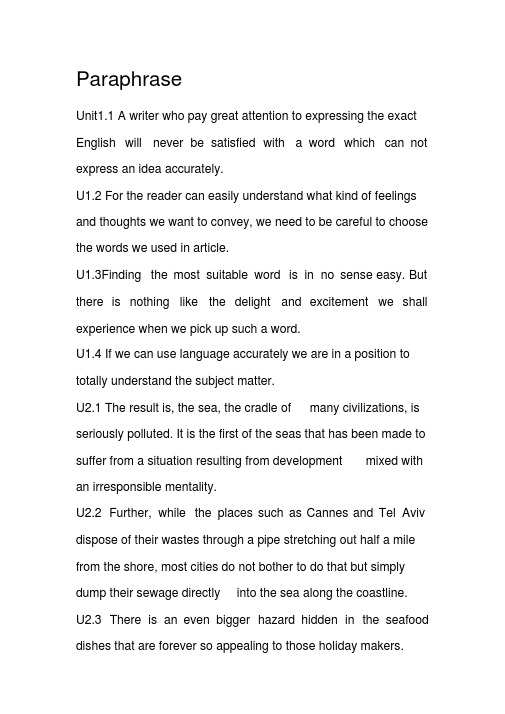
ParaphraseUnit1.1 A writer who pay great attention to expressing the exact English will never be satisfied with a word which can not express an idea accurately.U1.2 For the reader can easily understand what kind of feelings and thoughts we want to convey, we need to be careful to choose the words we used in article.U1.3Finding the most suitable word is in no sense easy. But there is nothing like the delight and excitement we shall experience when we pick up such a word.U1.4 If we can use language accurately we are in a position to totally understand the subject matter.U2.1 The result is, the sea, the cradle of many civilizations, is seriously polluted. It is the first of the seas that has been made to suffer from a situation resulting from development mixed with an irresponsible mentality.U2.2 Further, while the places such as Cannes and Tel Aviv dispose of their wastes through a pipe stretching out half a mile from the shore, most cities do not bother to do that but simply dump their sewage directly into the sea along the coastline.U2.3 There is an even bigger hazard hidden in the seafood dishes that are forever so appealing to those holiday makers.U2.4 Factories are set up around the coastline, few of which, including the most sophisticated, have been equipped with a satisfactory system for dealing with their effluents.U3.1 Einstein's natural ability of intuitively getting to the essence of a subject and unusual awareness of beauty were the key to his great discoveries.U3.2His engrossment was incredibly intense and deep. When meeting a difficult problem, he attempted to deal it with great effort, just like an animal chases its prey until it gets the prey.U3.3 He would look lost in thought, thinking about something distant, and yet meditating within himself. He did not seem to be in deep thought, nor did he knit his brows----he was just in self----contained peaceful contemplation.U3.4 Einstein's assumptions, considered separately, seemed to be reasonable, credible and clear in the original sense. But when considered together, they were so strongly contradictory to each other that a less learned scholar would have given up one or the other completely and would no longer take up the issue again.was done quietly with pencil on paper and U3.5Einstein’s workseemed to be far away from the confusion of everyday life, but his ideas were so radical that they led to strong arguments and made people unreasonably angry.U4.1The beautiful clothes worn by the poor and the myth story about the affluent society always cover the severe fact of the poor.U4.2 The middle class was misled by the beauty and myths mask of the poverty, and their unawareness made more complex this separation between the rich and the poor.U5.1Children have become television addicts, devoting much of the time when they are together to watching TV.U5.2 Television is not merely one among many important factors that may influence a child today.U5.3 Television has brought about great changes in family life, playing the dominant role in shaping the lives of chi ldren today.U5.4 .....the television has its magic power over people. As soon as the television is on, people stop talking and doin g anything else, becoming lifeless statues before the TV sc reen.U5.5 The moment a child sits down to watch television is the moment his growth towards maturity is suspended.Translate the following into EnglishU1.1 After citing many facts and listing some statistics, he finally drove home his points.U1.2It took us half a year more or less to finish the research project.U1.3.What he said was so subtle that we could hardly make out his true intention.U1.4His new book looks squarely at the contemporary social problems.U1.5 Today, the young generation is very much alive to the newest information which on the Internet.U1.6 Is a matter of opinion whether a foreign language is morehood or otherwise.easily learned in one’s childU1.7 Never lose heart in the face of a setback; just take courage and deal with it squarely.U1.8 Rice, meat, vegetables, and fruit constitute balanced diets. U2.1 One person's effort is not enough to cope with such a complicated situation.U2.2When do you think the new rules about information will take effect?U2.3 There is little chance to win the lottery, maybe only a one-in -hundred chance.U2.4 It is deplorable that many teenagers fall victim to poison.U2.5 There is virtually no one who support his proposal.U2.6 Beware of the swindler with a slick tongue and a smiling face.U2.7 Don’t touch the bag, The explosive i n it may blow up at any minute. Your life will be at risk.U2.8 He looked confident about his job,but he lurked some doubts in the depth of his mind.U3.1He honked his car horn to alert the pedestrians.U3.2 The fast development of information technology is an outstanding example of human endeavor.U3.3 Mary gropes for the proper words to express her thanks to the teachers.U3.4 The headmaster's plain words conveyed a message of challenge to the young people.U3.5 Don't tamper with the wires, or you may cause a short circuit.U3.6 He thought he could defeat any opponent in the competition , but his over-confidence led to his failure.U3.7 What he said seems simple, but we can't fathom the implicit meaning in it.U3.8 He tried to steer the groups random conversation to some constructive topics.U4.1Can I be exempt from the regular physical examination this year?I just had one three month ago before I went to the summer camp.U4.2 Could you tell me again what I should do next? It has slipped out of my mind what you said to me yesterday.U4.3We all assumed that Dave was a trustworthy person, but it turned out that we were wrong.U4.4His misfortune was compounded by his wife's ill and his loss of job.U4.5 Whether or not there are living beings in other space is of perennial interest to man.U4.6 When you are under great strain, you will not be abl e to think clearly.U4.7 Jim tends to lose his temper when his advice is not heeded. U4.8 Despite the teacher has erudite knowledge,he feels that it's difficult to speak articulately the need of students.U5.1 Jane is a smart girl, she can always give any question appropriate answers on the spur of the moment.U5.2 Our teacher attained full professorship before he was forty. U5.3 Environmental pollution is afflicts many cities and towns around the world.U5.4 Acupuncture therapy produces marked effects on patientssuffering from arthritis.U5.5 Instead of being profit-oriented, hospitals should make their efforts to take good care of the patients.U5.6 What sort of people are involved in the lawsuit?U5.7 The factory is taking drastic measures to ameliorate the working conditions in the workshop.U5.8 Outstanding young men and women are emerging from various walks of life .。
(完整word版)新编英语教程5(1-12)课文翻译.docx
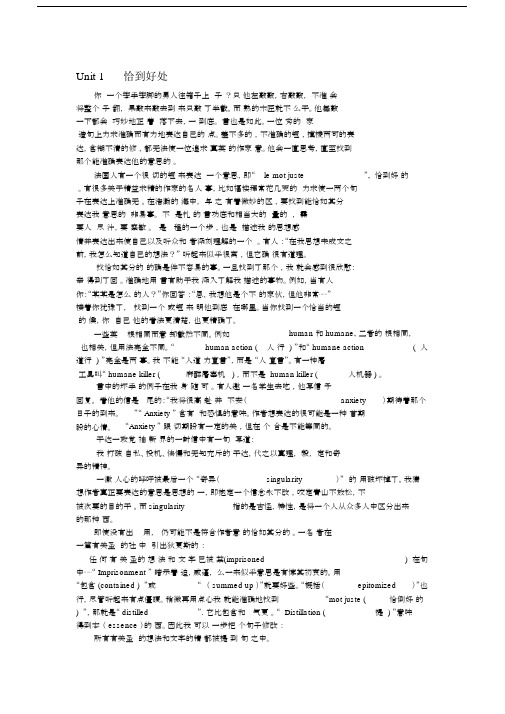
Unit 1恰到好处你一个笨手笨脚的男人往箱子上子?只他左敲敲,右敲敲,不准会将整个子翻,果敲来敲去到来只敲了半截。
而熟的木匠就不么干。
他每敲一下都会巧妙地正着落下去,一到底。
言也是如此。
一位秀的家造句上力求准确而有力地表达自己的点。
差不多的,不准确的短,摸棱两可的表达,含糊不清的修,都无法使一位追求真英的作家意。
他会一直思考,直至找到那个能准确表达他的意思的。
法国人有一个很切的短来表达一个意思,即“ le mot juste”, 恰到好的。
有很多关于精益求精的作家的名人事,比如福楼拜常花几天的力求使一两个句子在表达上准确无。
在浩瀚的海中,与之有着微妙的区,要找到能恰如其分表达我意思的非易事。
不是扎的言功底和相当大的量的,需要人尽汁,要察敏。
是程的一个步,也是描述我的思想感情并表达出来使自己以及听众和者深刻理解的一个。
有人:“在我思想未成文之前,我怎么知道自己的想法?” 听起来似乎很离,但它确很有道理。
找恰如其分的的确是件不容易的事。
一旦找到了那个,我就会感到很欣慰:辛得到了回。
准确地用言有助于我深入了解我描述的事物。
例如,当有人你:“某某是怎么的人?”你回答:“恩,我想他是个不的家伙,但他非常⋯⋯”接着你犹豫了,找到一个或短来明他到底在哪里。
当你找到一个恰当的短的候,你自己他的看法更清楚,也更精确了。
一些英根相同而意却截然不同。
例如human 和 humane, 二者的根相同,也相关,但用法完全不同。
“human action (人行 ) ”和“ humane action( 人道行 ) ”完全是两事。
我不能“人道力宣言”,而是“人宣言”。
有一种屠工具叫“ humane killer (麻醉屠宰机 ) ,而不是 human killer (人机器 ) 。
言中的坏手的例子在我身随可。
有人邀一名学生去吃,他写信予回复。
看他的信是尾的:“我将很高赴并不安(anxiety)期待着那个日子的到来。
”“ Anxiety ”含有和恐惧的意味。
Unit3Lying全新版大学英语综合教程五课文翻译
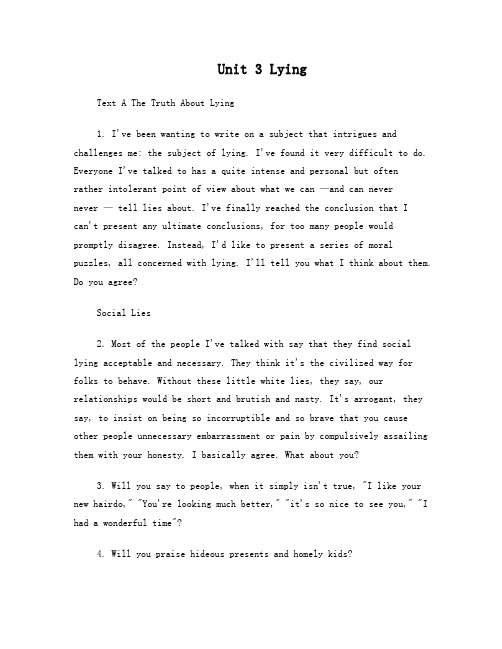
Unit 3 LyingText A The Truth About Lying1. I've been wanting to write on a subject that intrigues and challenges me: the subject of lying. I've found it very difficult to do. Everyone I've talked to has a quite intense and personal but oftenrather intolerant point of view about what we can —and can nevernever — tell lies about. I've finally reached the conclusion that Ican't present any ultimate conclusions, for too many people would promptly disagree. Instead, I'd like to present a series of moral puzzles, all concerned with lying. I'll tell you what I think about them. Do you agree?Social Lies2. Most of the people I've talked with say that they find social lying acceptable and necessary. They think it's the civilized way for folks to behave. Without these little white lies, they say, our relationships would be short and brutish and nasty. It's arrogant, they say, to insist on being so incorruptible and so brave that you cause other people unnecessary embarrassment or pain by compulsively assailing them with your honesty. I basically agree. What about you?3. Will you say to people, when it simply isn't true, "I like your new hairdo," "You're looking much better," "it's so nice to see you," "I had a wonderful time"?4. Will you praise hideous presents and homely kids?5. Will you decline invitations with "We're busy that night — so sorry we can't come," when the truth is you'd rather stay home than dine with the So-and-sos?6. And even though, as I do, you may prefer the polite evasion of "You really cooked up a storm "instead of "The soup" —which tastes like warmed-over coffee —"is wonderful," will you, if you must, proclaim it wonderful?7. There's one man I know who absolutely refuses to tell social lies. "I can't play that game," he says; "I'm simply not made that way." And his answer to the argument that saying nice things to someonedoesn't cost anything is, "Yes, it does — it destroys your credibility." Now, he won't, unsolicited, offer his views on thepainting you just bought, but you don't ask his frank opinion unless you want frank, and his silence at those moments when the rest of us liars are muttering, "Isn't it lovely?" is, for the most part, eloquent enough. My friend does not indulge in what he calls "flattery, false praise and mellifluous comments." When others tell fibs he will not go along. He says that social lying is lying, that little white lies are still lies. And he feels that telling lies is morally wrong. What about you?Peace-Keeping Lies8. Many people tell peace-keeping lies: lies designed to avoid irritation or argument, lies designed to shelter the liar from possible blame or pain; lies (or so it is rationalized) designed to keep trouble at bay without hurting anyone.9. I tell these lies at times, and yet I always feel they're wrong.I understand why we tell them, but still they feel wrong. And whenever I lie so that someone won't disapprove of me or think less of me or holler at me, I feel I'm a bit of a coward, I feel I'm dodging responsibility, I feel...guilty. What about you?10. Do you, when you're late for a date because you overslept, say that you're late because you got caught in a traffic jam?11. Do you, when you forget to call a friend, say that you called several times but the line was busy?12. Do you, when you didn't remember that it was your father's birthday, say that his present must be delayed in the mail?13. And when you're planning a weekend in New York City and you're not in the mood to visit your mother, who lives there, do you conceal —with a lie, if you must — the fact that you'll be in New York? Or do you have the courage — or is it the cruelty? — to say, "I'll be in New York, but sorry — I don't plan on seeing you"?14. (Dave and his wife Elaine have two quite different points of view on this very subject. He calls her a coward. She says she's being wise. He says she must assert her right to visit New York sometimes and not see her mother. To which she always patiently replies: "Why should we have useless fights? My mother's too old to change. We get along much better when I lie to her.")15. Finally, do you keep the peace by telling your husband lies on the subject of money? Do you reduce what you really paid for your shoes?And in general do you find yourself ready, willing and able to lie to him when you make absurd mistakes or lose or break things?16. "I used to have a romantic idea that part of intimacy was confessing every dumb thing that you did to your husband. But after a couple of years of that," says Laura, "haveI changed my mind!"17. And having changed her mind, she finds herself telling peacekeeping lies. And yes, I tell them too. What about you?Protective Lies18. Protective lies are lies folks tell —often quite seriouslies —because they're convinced that the truth would be too damaging. They lie because they feel there are certain human values that supersede the wrong of having lied. They lie, not for personalgain, but because they believe it's for the good of the personthey're lying to. They lie to those they love, to those who trust them most of all, on the grounds that breaking this trust is justified.19. They may lie to their children on money or marital matters.20. They may lie to the dying about the state of their health.21. They may lie to their closest friend because the truth about her talents or son or psyche would be — or so they insist — utterly devastating.22. I sometimes tell such lies, but I'm aware that it's quite presumptuous to claim I know what's best for others to know. That's called playing God . That's called manipulation and control. And wenever can be sure, once we start to juggle lies, just where they'll land, exactly where they'll roll.23. And furthermore, we may find ourselves lying in order to backup the lies that are backing up the lie we initially told.24. And furthermore —let's be honest —if conditions were reversed, we certainly wouldn't want anyone lying to us.25. Yet, having said all that, I still believe that there are times when protective lies must nonetheless be told. What about you?Trust-Keeping Lies26. Another group of lies are trust-keeping lies, lies that involve triangulation, with A (that's you) telling lies to B on behalf of C (whose trust you'd promised to keep). Most people concede that onceyou've agreed not to betray a friend's confidence, you can't betray it, even if you must lie. But I've talked with people who don't want you telling them anything that they might be called on to lie about.27. "I don't tell lies for myself," says Fran, "and I don't want to have to tell them for other people." Which means, she agrees, that ifher best friend is having an affair, she absolutely doesn't want to know about it.28. "Are you saying," her best friend asks, "that you'd betray me?"29. Fran is very pained but very adamant. "I wouldn't want to betray you, so…don't tell me anything about it."30. Fran's best friend is shocked. What about you?31. Do you believe you can have close friends if you're not prepared to receive their deepest secrets?32. Do you believe you must always lie for your friends?33. Do you believe, if your friend tells a secret that turns out to be quite immoral or illegal, that once you've promised to keep it, you must keep it?34. And what if your friend were your boss — if you were perhaps one of the President's men — would you betray or lie for him over, say, Watergate?35. As you can see, these issues get terribly sticky.36. It's my belief that once we've promised to keep a trust, we must tell lies to keep it. I also believe that we can't tell Watergate lies. And if these two statements strike you as quite contradictory,you're right —they're quite contradictory. But for now they're the best I can do. What about you?37. There are those who have no talent for lying.38. "Over the years, I tried to lie," a friend of mine explained, "but I always got found out and I always got punished. I guess I gavemyself away because I feel guilty about any kind of lying. It looks as if I'm stuck with telling the truth."39. For those of us, however, who are good at telling lies, for those of us who lie and don't get caught, the question of whether or not to lie can be a hard and serious moral problem. I liked the remark of a friend of mine who said, "I'm willing to lie. But just as a lastresort — the truth's always better."40. "Because," he explained, "though others may completely accept the lie I'm telling, I don't."41. I tend to feel that way too.42. What about you?关于说谎的真相朱迪斯·维奥斯特我一直想写一个令我深感兴趣的话题:关于说谎的问题。
新编大学英语综合教程课文翻译第一册

Unit 1 Personal Relationships1-1 The gift of life【1】炸弹落在了这个小村庄里。
在可怕的越南战争期间,谁也不知道这些炸弹要轰炸什么目标,而它们却落在了一所由传教士们办的小孤儿院内。
【2】传教士和一、两个孩子已经丧生,还有几个孩子受了伤,其中有一个小女孩,8岁左右,她的双腿被炸伤。
【3】几小时后,医疗救援小组到了。
救援小组由一名年轻的美国海军医生和一名同样年轻的海军护士组成。
他们很快发现有个小女孩伤势严重。
如果不立即采取行动,显然她将因失血过多和休克而死亡。
【4】他们明白必须给小女孩输血,但是他们的医药用品很有限,没有血浆,因此需要一种相配的血型。
快速的血型测定显示两名美国人的血型都不合适。
几个没有受伤的孤儿却有相配的血型。
【5】这位医生会讲一点越南语,护士会讲一点法语,但只有中学的法语水平。
孩子们不会说英语,只会说一点法语。
医生和护士用少得可怜的一点共同语言,结合大量的手势语,努力向这些受惊吓的孩子们解释说,除非他们能输一些血给自己的小伙伴,否则她将必死无疑。
接着问他们是否有人愿意献血来救小女孩。
【6】对医生和护士的请求,孩子们(只是)瞪大眼睛,一声不吭。
此时小病人生命垂危。
然而,只有这些受惊吓的孩子中有人自愿献血,他们才能够得到血。
过了好一会儿,一只小手慢慢地举了起来,然后垂了下去,一会儿又举了起来。
【7】"噢,谢谢。
" 护士用法语说。
"你叫什么名字?"【8】"兴," 回答道。
【9】兴很快被抱到一张床上,手臂用酒精消毒后,针就扎了进去。
在整个过程中,兴僵直地躺着,没有出声。
【10】过了一会儿,他发出了一声长长的抽泣,但立即用那只可以活动的手捂住了自己的脸。
【11】"兴,疼吗?" 医生问。
【12】兴默默地摇了摇头,但一会儿忍不住又抽泣起来,并又一次试图掩饰自己的哭声。
医生又问是否是插在手臂上的针弄疼了他,兴又摇了摇头。
新编实用英语综合教程(第四版)上册 Unit1-Unit3 课文段落翻译
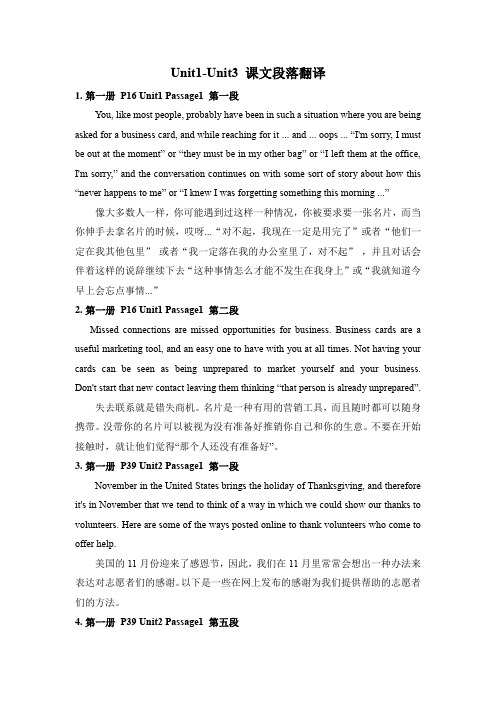
Unit1-Unit3 课文段落翻译1.第一册P16 Unit1 Passage1 第一段You, like most people, probably have been in such a situation where you are being asked for a business card, and while reaching for it ... and ... oops ... “I'm sorry, I must be out at the moment” or “they must be in my other bag” or “I left them at the office, I'm sorry,” and the conversation continues on with some sort of story about how this “never happens to me” or “I knew I was forgetting something this morning ...”像大多数人一样,你可能遇到过这样一种情况,你被要求要一张名片,而当你伸手去拿名片的时候,哎呀...“对不起,我现在一定是用完了”或者“他们一定在我其他包里”或者“我一定落在我的办公室里了,对不起”,并且对话会伴着这样的说辞继续下去“这种事情怎么才能不发生在我身上”或“我就知道今早上会忘点事情...”2.第一册P16 Unit1 Passage1 第二段Missed connections are missed opportunities for business. Business cards are a useful marketing tool, and an easy one to have with you at all times. Not having your cards can be seen as being unprepared to market yourself and your business. Don't start that new contact leaving them thinking “that person is already unprepared”.失去联系就是错失商机。
新编英语教程5课文翻译(unit115)(学生必备)

Unit 1 hit the nail on the head 恰到好处Have you ever watche d a clumsy man hammer ing a nail into a box? He hits it firstto one side, then to anothe r, perhap s knocki ng it over compl e t ely,so that in the end he only gets half of it into the wood. A skill f u l carpen ter, on the otherhand, will drivethe nail with a few firm, deft blows,hittin g it each time square ly on the head. So with langua ge; the good crafts man will choose wordsthat drivehome his pointfirmly and exactl y. A word that is more or less right,a loosephrase, an ambigu ous expres sion,a vagueadject ive(模糊的形容词), will not satisf y a write r who aims at cleanEnglis h. He will try always to get the word that is comple telyrightfor his purpos e.你见过一个笨手笨脚的男人往箱子上钉钉子吗?只见他左敲敲,右敲敲,说不准还会将整个钉子锤翻,结果敲来敲去到头来只敲进了半截。
李观仪《新编英语教程》第5册 UNIT5
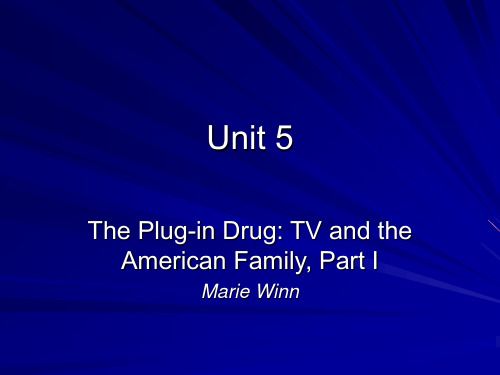
3. Victorian era: Victoria‟s reputation in Britain was also due to her personality. She set a very severe home discipline for her children. Any dishonesty, mischief, negligence or rude language might result in beatings for them. She herself was very careful about her behaviour on public occasions. In addition, she maintained a very harmonious relation with her husband and almost set a standard for domestic virtues of rectitude(正直)of personal conduct. Victoria‟s achievements were so popular in Britain and her personality was so widely esteemed and imitated by the middle class that the epithet Victorian was later applied to any person or time with the characteristics of decency and morality, self-satisfaction based on wealth, conscious rectitude, unquestioning acceptance of authority and orthodoxy, and great industrial and scientific development. Her time was thus called “the polite society” in English history.
新编英语教程5 Unit 11 Cultivating A Hobby
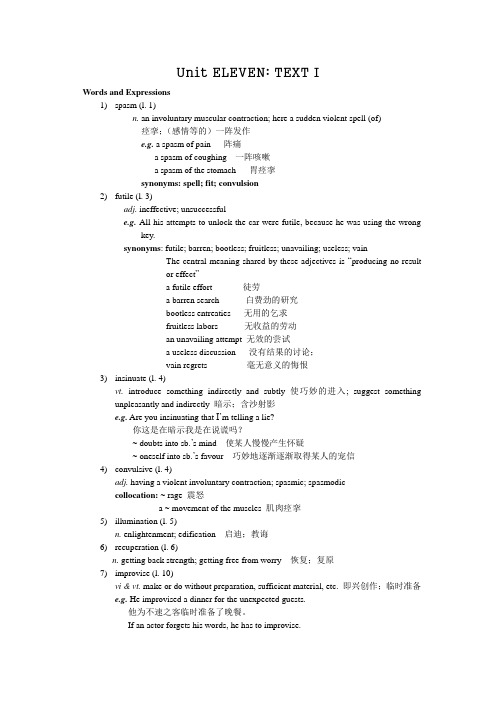
Unit ELEVEN: TEXT IWords and Expressions1)spasm (l. 1)n. an involuntary muscular contraction; here a sudden violent spell (of)痉挛;(感情等的)一阵发作e.g. a spasm of pain 阵痛a spasm of coughing 一阵咳嗽a spasm of the stomach 胃痉挛synonyms: spell; fit; convulsion2)futile (l. 3)adj. ineffective; unsuccessfule.g. All his attempts to unlock the car were futile, because he was using the wrongkey.synonyms: futile; barren; bootless; fruitless; unavailing; useless; vainThe central meaning shared by these adjectives is “producing no resultor effect”a futile effort 徒劳a barren search 白费劲的研究bootless entreaties 无用的乞求fruitless labors 无收益的劳动an unavailing attempt 无效的尝试a useless discussion 没有结果的讨论;vain regrets 毫无意义的悔恨3)insinuate (l. 4)vt. introduce something indirectly and subtly 使巧妙的进入; suggest something unpleasantly and indirectly 暗示;含沙射影e.g. Are you insinuating that I’m telling a lie?你这是在暗示我是在说谎吗?~ doubts into sb.’s mind 使某人慢慢产生怀疑~ oneself into sb.’s favour 巧妙地逐渐逐渐取得某人的宠信4)convulsive (l. 4)adj. having a violent involuntary contraction; spasmic; spasmodiccollocation: ~ rage 震怒a ~ movement of the muscles 肌肉痉挛5)illumination (l. 5)n. enlightenment; edification 启迪;教诲6)recuperation (l. 6)n. getting back strength; getting free from worry 恢复;复原7)improvise (l. 10)vi & vt. make or do without preparation, sufficient material, etc. 即兴创作;临时准备e.g. He improvised a dinner for the unexpected guests.他为不速之客临时准备了晚餐。
全新版大学英语综合教程5翻译答案(1-7全)
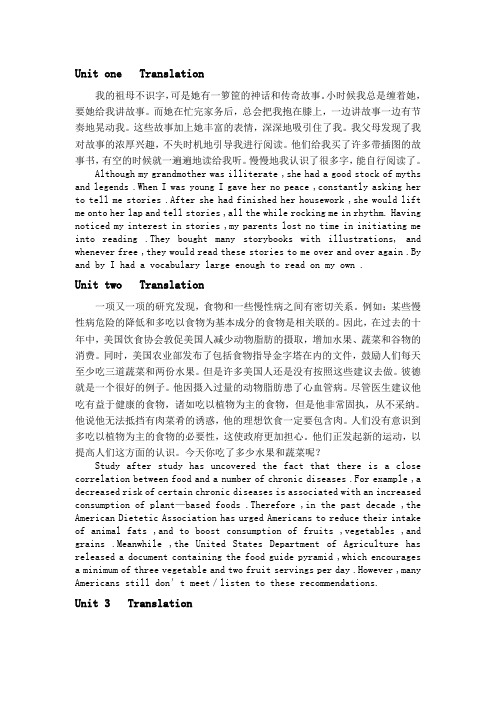
Unit one Translation我的祖母不识字,可是她有一箩筐的神话和传奇故事。
小时候我总是缠着她,要她给我讲故事。
而她在忙完家务后,总会把我抱在膝上,一边讲故事一边有节奏地晃动我。
这些故事加上她丰富的表情,深深地吸引住了我。
我父母发现了我对故事的浓厚兴趣,不失时机地引导我进行阅读。
他们给我买了许多带插图的故事书,有空的时候就一遍遍地读给我听。
慢慢地我认识了很多字,能自行阅读了。
Although my grandmother was illiterate ,she had a good stock of myths and legends .When I was young I gave her no peace ,constantly asking her to tell me stories .After she had finished her housework ,she would lift me onto her lap and tell stories ,all the while rocking me in rhythm. Having noticed my interest in stories ,my parents lost no time in initiating me into reading .They bought many storybooks with illustrations, and whenever free ,they would read these stories to me over and over again .By and by I had a vocabulary large enough to read on my own .Unit two Translation一项又一项的研究发现,食物和一些慢性病之间有密切关系。
例如:某些慢性病危险的降低和多吃以食物为基本成分的食物是相关联的。
新编跨文化交际英语教程1-6单元翻译(Word可编辑版)

纵观历史,我们可以清楚地看到,人们由于彼此所处地域、意识形态、容貌服饰和行为举止上存在的差异,而长久无法互相理解、无法和睦相处。
在这种情况下,跨文化交际作为一个特定的研究领域得以形成和发展。
值得注意的是, 人类文明在发展过程中所遭受的许多挫折, 既是个人的, 又是全球性的: 人类历史进程总是充满了个人问的直接冲突和民族间的误解一一从骂骂咧咧到孤立主义直至到武装冲突, 大大小小争端不绝。
很显然, 文化间以及亚文化问的交往比以前多了, 这迫切要求我们共同努力, 去理解有着不同信仰和文化背景的人们, 并与之和睦相处。
通过加深认识和理解, 我们能够与生活方式、价值观念不同的人们和平共处: 这不但有益于我们周遭环境的安定, 也是维护世界和平的决定性因素。
Translation Unit 2文化有时候被称为我们的心智程序, 我们“头脑的软件”。
但是, 我们可以进一步引中这个用电脑所做的类比, 把文化看作是支持运行的操作环境。
文化就像电脑使用的Dos 或者unix 或者“视窗”(windows) 等操作系统一样, 使我们能在各种各样的实际应用中处理信息。
用“视窗”这个比喻来描述文化似乎也很有吸引力。
文化就是我们心灵的视窗,透过它我们审视生活的方方面面。
一个社会中不同个体的视窗是不大一样的, 但都有着一些重要的共同特征。
文化就好像是鱼畅游于其中的水一般, 人们想当然地把文化看成是客观存在的事实, 因而很少去研究它。
文化存在于我们所呼吸的空气之中, 文化对于我们了解我们自身之为何物是必不可少的, 就正如生命离不开空气一样。
文化是特定群体的共有财产, 而不单是个体的特征。
社会按照文化设定的程序运作, 这种程序来自于相似的生活体验以及对这种生活体验之含义的相似阐释。
如果文化是一种心智程序, 那么它也是现实的心灵地图。
从我们很小的时候开始, 文化就告诉我们应该看重什么、偏好什么、规避什么和做些什么, 文化还告诉我们事物应该是什么样。
新编英语教程第5册1-7单元练习册翻译答案

unit 11. 在举出许多事实并列出一些统计数字后,他终于把他的论点说清楚了。
After citing many facts and giving a number of statistical figures, he finally drove home his point.2.差不多花了半年工夫,我们才完成了那研究项目。
It took us half a year more or less to carry through the research project.3.她说的话是如此微妙我们很难理解他的真实意图。
What he said was so subtle that we could hardly make out his true intention.4.他的新书明确无误的审视了当代的问题。
His new book looks squarely at the contemporary social problems.5.今日的年轻一代对互联网上的最新信息很敏感。
The younger generation today is very much alive to the latest information found on the Internet.6.外语是不是在童年更容易学好?这是一个观点问题。
It is a matter of opinion whether a foreign language is more easily learned in one’s childhood or otherwise.7.在挫折面前千万不要丧失信心;鼓起勇气坚定不移地去克服它。
Never lose heart in the face of a setback; take courage and deal with it squarely.8.米饭、肉类、蔬菜、水果构成均衡的饮食。
Rice, meat, vegetables, and fruit constitute a balanced diet.Unit 21一个人的努力不足以应付如此复杂的情况。
- 1、下载文档前请自行甄别文档内容的完整性,平台不提供额外的编辑、内容补充、找答案等附加服务。
- 2、"仅部分预览"的文档,不可在线预览部分如存在完整性等问题,可反馈申请退款(可完整预览的文档不适用该条件!)。
- 3、如文档侵犯您的权益,请联系客服反馈,我们会尽快为您处理(人工客服工作时间:9:00-18:30)。
Unit 1 恰到好处Have you ever watched a clumsy man hammering a nail into a box? He hits it first to one side, then to another, perhaps knocking it over completely, so that in the end he only gets half of it into the wood. A skillful carpenter, on the other hand, will drive the nail with a few firm, deft blows, hitting it each time squarely on the head. So with language; the good craftsman will choose words that drive home his point firmly and exactly. A word that is more or less right, a loose phrase, an ambiguous expression, a vague adjective(模糊的形容词), will not satisfy a writer who aims at clean English. He will try always to get the word that is completely right for his purpose.你见过一个笨手笨脚的男人往箱子上钉钉子吗?只见他左敲敲,右敲敲,说不准还会将整个钉子锤翻,结果敲来敲去到头来只敲进了半截。
而娴熟的木匠就不这么干。
他每敲一下都会坚实巧妙地正对着钉头落下去,一钉到底。
语言也是如此。
一位优秀的艺术家谴词造句上力求准确而有力地表达自己的观点。
差不多的词,不准确的短语,摸棱两可的表达,含糊不清的修饰,都无法使一位追求纯真英语的作家满意。
他会一直思考,直至找到那个能准确表达他的意思的词。
The French have an apt(贴切的)phrase for this. They speak of “le mot juste,”(the exact word) the word that is just right. Stories are told of scrupulous(一丝不苟的)writers, like Flaubert, who spent days trying to get one or two sentences exactly right. Words are many and various; they are subtle(微妙的)and delicate(细腻的)in their different shades(色调)of meaning, and it is not easy to find the ones that express precisely(正是,恰恰)what we want to say. It is not only a matter of having a good command of language and a fairly wide vocabulary; it is also necessary to think hard and to observe accurately. Choosing words is part of the process of realization, of defining our thoughts and feelings for ourselves, as well as for those who hear or read our words. Someone once remarked: “How can I know what I think till I see what I say?” this sounds stupid, but there is a great deal of truth in it.法国人有一个很贴切的短语来表达这样一个意思,即“le mot juste”, 恰到好处的词。
有很多关于精益求精的作家的名人轶事,比如福楼拜常花几天的时间力求使一两个句子在表达上准确无误。
在浩瀚的词海中,词与词之间有着微妙的区别,要找到能恰如其分表达我们意思的词绝非易事。
这不仅仅是扎实的语言功底和相当大的词汇量的问题,还需要人们绞尽脑汁,要观察敏锐。
选词是认识过程的一个步骤,也是详细描述我们的思想感情并表达出来使自己以及听众和读者深刻理解的一个环节。
有人说:“在我思想未成文之前,我怎么知道自己的想法?”这听起来似乎很离谱,但它确实很有道理。
It is hard work choosing the right words, but we shall be rewarded by the satisfaction that finding them brings. The exact use of language gives us mastery(掌握)over the material we are dealing with. Perhaps you have been asked “What sort of a man is so-and-so(某某等)?” You begin: “Oh, I think he’s quite a nice chap (家伙)but he’s rather…” and then you hesitate trying to find a word or phrase to express what it is about him that you don’t like, that constitutes(构成)his limitation. When you find the right phrase you feel that your conception of the man is clearer and sharper.寻找恰如其分的词的确是件不容易的事。
一旦找到了那个词,我们就会感到很欣慰:辛劳得到了回报。
准确地用语言有助于我们深入了解我们描述的事物。
例如,当有人问你:“某某是怎么样的人?”你回答说:“恩,我想他是个不错的家伙,但他非常……”接着你犹豫了,试图找到一个词或短语来说明他到底讨厌在哪里。
当你找到一个恰当的短语的时候,你发觉自己对他的看法更清楚,也更精确了。
Some English words have a common root but are used in very different senses. Consider human and humane(人道,仁慈的), for example. Their origin is the same and their meanings are related, but their usage is distinct. A human action is not the same thing as a humane action. We cannot speak of a Declaration of Humane Rights. --- There is a weapon called a humane killer, but it is not a human killer.一些英语词汇词根相同而意义却截然不同。
例如human 和humane,二者的词根相同,词义也相关,但用法完全不同。
“ human action (人类行为)”和“humane action ( 人道行为)”完全是两码事。
我们不能说“人道权力宣言”,而是说“人权宣言”。
有一种屠杀工具叫“h umane killer ( 麻醉屠宰机),而不是human killer ( 杀人机器)。
We don’t have to look far afield to find evidence of bad carpentry in language. A student, replying to an invitation to dinner, finished his letter: “I shall be delighted to come and I am looking forward to the day with anxiety.”Anxiety carries with it suggestions of worry and fear. What the writer meant was possibly eagerness. Anxiety has some kinship(亲属关系)with eagerness but it will not do as a substitute(替代)in this context.语言中的坏手艺的例子在我们身边随处可见。
有人邀请一名学生去吃饭,他写信给予回复。
请看他的信是这样结尾的:“我将很高兴赴约并满怀不安(anxiety )期待着那个日子的到来。
”“Anxiety” 含有烦恼和恐惧的意味。
作者想表达的很可能是一种翘首期盼的心情。
“Anxiety” 跟热切期盼有一定的关联,但在这个场合是不能等同的。
The leader of a political party in Uganda wrote a letter to the Press which contained this sentenc e:乌干达一政党领袖给新闻界的一封信中有一句这样写道:Let us all fight this selfishness, opportunism, cowardice and ignorance now rife in Uganda and put in their place truth, manliness, consistency and singularity of mind.让我们打破这自私、投机、怯懦和无知充斥的乌干达,代之以真理,刚毅,坚定和奇异的精神。
This stirring appeal is spoilt by a malapropism in the last phrase, the word singularity. What the writer meant, I think, was singleness of mind, holding steadfastly to the purpose in mind, without being drawn aside by less worthy objects. Singularity means oddity or peculiarity, something that singles a man out from other men这一激动人心的呼吁被最后一个词“奇异(singularity)” 的误用破坏掉了。
